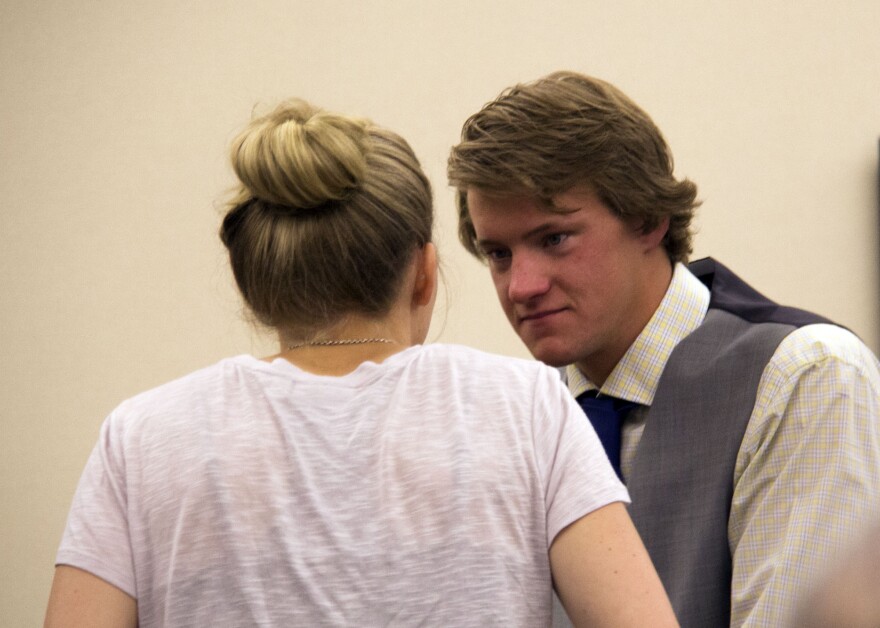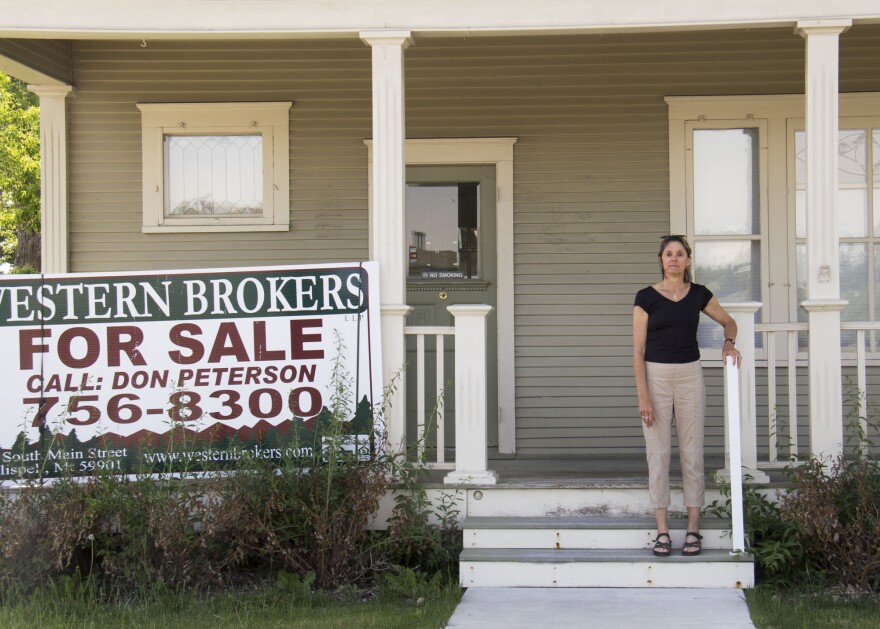When Zachary Klundt broke into and vandalized All Families Healthcare in Kalispell, in March 2014, he destroyed the only clinic providing abortions in the Flathead Valley.
Now, over a year later, the clinic remains closed, and the building is now used to help people file taxes.
Thursday, Klundt was sentenced for 20-years, with 15-years suspended. He was also ordered to pay to the clinic’s owner, Susan Cahill, and other victims of over $600,000 in restitution.
Before his sentence was handed down Klundt read an apology to Cahill and to everyone his actions hurt.
"I cannot even believe I did that to another soul, but I did that to you. I know what it’s like to live with fear and for me to do that to you is awful. And I am truly so sorry," Klundt said.
Klundt has a history of mental illness and substance abuse. At the time he destroyed the clinic Klundt was grieving from a divorce and depressed. He said he broke into the clinic looking for prescription drugs.
Cahill says what happened to her was terrorism and her business was attacked because she provided abortions.
"And what we need to do in this community is tell, no this cannot happen. We have to make a resolution that says this will not be tolerated in this community."
Cahill used to provide abortion services in two buildings in Kalispell under the business name All Families Healthcare. Cahill moved out of the first building when her landlord notified her the building had sold. Cahill later learned it had been sold to the passionately pro-life executive director of Hope Pregnancy Ministries.
The building that she moved All Families Healthcare into was vandalized by Klundt three weeks after Cahill moved in.
Klundt is the son of Twyla Klundt, a former board member of Hope Pregnancy Ministries. Twyla resigned her position after her son's arrest.
Klundt texted his mother before the break-in, asking where the “abortionist” worked.
Hope Pregnancy Ministries says Zachary Klundt’s actions were not sanctioned by the ministry.

Klundt says he alone is responsible for his actions and he is working on turning his life around. He says at this point, he is 15 months sober.
Michelle Reimer is the executive director of Hope Pregnancy Ministries. She bought the building Cahill first used under the impression Cahill would retire.
"And our understanding was that when the building sold, Susan was planning to retire. It seemed like a reasonable thing to do knowing that that was her plan anyway."
There has never been a welcome mat for abortion service providers in the Flathead Valley. Doctor James Armstrong became the first abortion service provider in the Flathead in the 1970s under the then recent decision in Roe v. Wade. Armstrong hired Cahill in 1977 to help provide abortions. But as Armstrong’s practice grew, so did the opposition to what he was doing.
"I think the experience can be dangerous in any place," says Armstrong.
In 1994, their clinic was fire-bombed.
"The picketing and the obstructions and the nasty letters. Self- righteous. That’s the general experience around the country," according to Armstrong.
A year after the fire-bombing, a Kalispell representative sponsored a bill in the Montana Legislature to make it illegal for physicians assistants, or PAs, to perform abortions. The bill passed. Cahill was the only PA in Montana performing abortions at that time and filed suit. The two-year state constitutional case upheld Cahill’s right to perform abortions.
Cahill opened All Families Healthcare when Armstrong retired. Cahill performed abortions as a physician's assistant for 38 years, until Zachary Klundt vandalized her clinic and she was forced to close it’s doors.
"And the problem, well there are many problems," Cahill says while standing outside the building where she started her own practice, "but one of the problems is access. It is the only procedure that has limited access. The only procedure, health care concern, that has few providers."

With that access now removed from the Flathead, Cahill’s patients, must go elsewhere for medical treatment.
According to the Guttmacher Institute, American women traveled an average of 30 miles, in 2008, to access abortion services. Today, a woman in Kalispell would need to drive around 120 miles one way to have an abortion.
"I know from talking with our providers that we have seen a definite increase of women from the Flathead area," says Melissa Barcroft of Planned Parenthood in Missoula.
Barcroft says abortion services can be hard to find in a big rural state like Montana, but women are willing to drive long distances for health care.
"Anytime a provider stops providing services, the need doesn’t go away. Patients still need that care."
But with that care now often hundreds of miles away, both Barcroft and Cahill say some women may not be able to access the medical care they need.
According to the Guttmacher Institute, American women traveled an average of 30 miles, in 2008, to access abortion services. Today, a woman in Kalispell would need to drive around 120 miles one way to have an abortion.
“So, the disadvantaged are always the ones that lose," Cahill explains. "Now you’ve got people who are on Medicare, or are from Browning, that are teenagers and it is much harder for them to get to Missoula. And I used to give gas money for people to go home. Now those people, it is just a harder struggle for them."
Cahill says the Flathead Valley has the ability to ease that struggle, but not the desire. Cahill says there are plenty of OBGYNs in the area trained in female medicine capable of giving abortions, but no one wants to step up and take the risk.
"But because I was the only one, I got targeted."
That fear of being targeted is what keeps another clinic from opening.
No one wants to lose everything.
"I’ve worked since I was 17," says Cahill. "Everything I’ve had, I’ve worked for. And I had a plan. not only did I have to take my social security out sooner than I was going to, I lost my simple IRA because you have to be an employee. And I was an employee of my business. And I lost my business that I was going to sell."
Samantha Avery thought about going to medical school when she shadowed Cahill at All Families Healthcare.
"And I know that she wanted me to be the one to take over her clinic, and even before all of this I told her, I just don’t know if I could do that to my family, my future family. I can’t be the Susan Cahill, I’m not that brave of a person," says Avery.
After the destruction of Cahill’s clinic, no one stepped in to fill the void in services. Cahill doesn’t know if she’ll ever open another clinic.
After seeing Cahill’s life turned upside and clinic torn apart, Avery doesn’t want that to happen to her or her husband.
"And at this point now, she [Cahill] has lost everything," Avery says. "She can’t even get hired anymore because everyone is so worried about what that would bring and it's terrible. And no one is going to want to step in and be a liability and have their life at risk.”
For Cahill, it wasn’t just Klundt that removed her work from the valley, it was the pro-life organizations that didn’t want her there too.
"They are not taking any responsibility for what they have done. They have done this. It is not just Zachary. Zachary in a way, was a puppet."
Hope Pregnancy Ministries Executive Director Michelle Reimer, says what happened to Cahill was terrible, and that kind of violence shouldn’t happen in this community.
"And I hope that there is no antagonism out there. I really do," Reimer says. "There is not a place for it in a Christian organization. And then there is always going to be the outlier, the one who represents us poorly, or who says the wrong thing, or as we all would with a very volatile topic like abortion, express ourselves passionately rather logically. And I think we see that on both sides."
Reimer says the biggest part of her faith is compassion. And telling women regardless of what she chooses, she is loved.
The Klundt family says they have never picketed Cahill’s office or her work.
For women in the Flathead, Cahill says the choice is not any easier now that her clinic is gone and Klundt is sentenced.
Both Reimer and Cahill says pregnancy always contains the question: what’s next? For some of Cahill’s patients, that questioning is being asked along with: where will I go for the health care I need?



